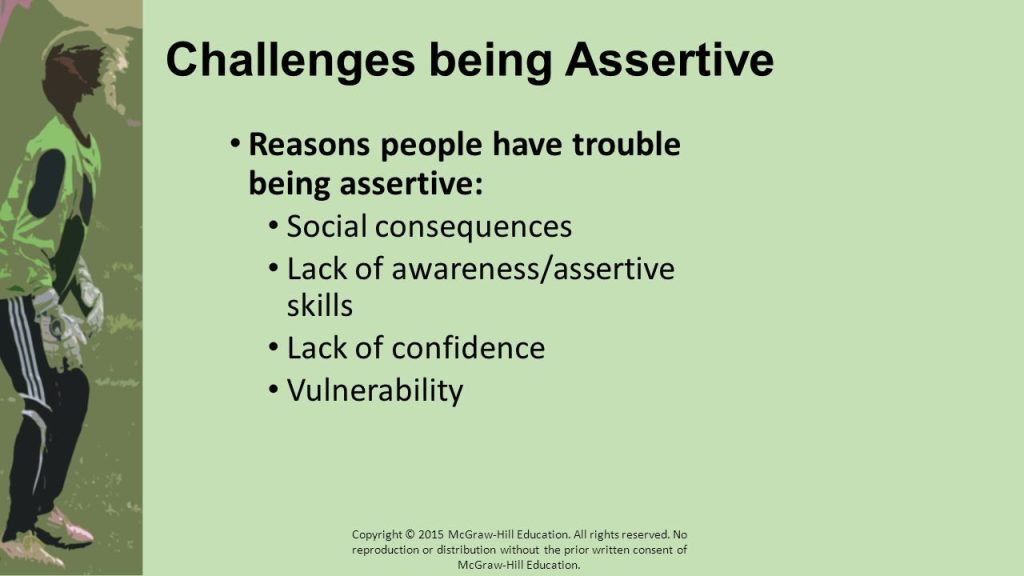How to be more assertive?
Learn how to be more assertive? with our comprehensive guide. Discover the importance, signs, benefits, and challenges of assertiveness, and get practical tips for effective communication.
Have you ever felt like a doormat in conversations, unable to express your thoughts or defend your opinions? Assertiveness is a crucial skill that can improve both your personal and professional life. In this comprehensive guide, we’ll explore what assertiveness is, why it’s important, and how you can develop this essential skill.

Assertiveness is a game-changer in both personal and professional settings, empowering you to express your thoughts, feelings, and needs clearly and respectfully. To boost your assertiveness, start by identifying your needs and wants, then communicate them using “I” statements to avoid blaming others. Master the art of saying “no” without guilt, and learn to handle criticism with grace. By practicing active listening and setting firm boundaries, you’ll not only improve your communication skills but also enhance your self-esteem and relationships. So why wait? Take the first step towards becoming more assertive today!
What is Assertiveness and Why is it Important?
Assertiveness is the ability to express your thoughts, feelings, and needs in an open, honest, and respectful manner. It’s not about being aggressive or domineering, but about standing up for yourself while respecting others. Being assertive is important because it fosters clear communication, builds self-esteem, and helps you make informed decisions.
What are the Signs of Assertiveness?
Signs of assertiveness include clear communication, the ability to set boundaries, and emotional intelligence. Assertive individuals are good at listening, can easily say “no” when needed, and are not afraid to express their opinions. They also maintain eye contact and use open body language to convey their messages.
What are the Benefits of Being Assertive?
Being assertive comes with numerous benefits. It improves communication, strengthens relationships, and boosts self-esteem. In the workplace, assertiveness can lead to career advancement and job satisfaction. It also helps in conflict resolution and promotes a balanced life.
What are the Challenges of Being Assertive?
While being assertive has its perks, it’s not without challenges. You may face resistance from others who are not used to your assertive behavior. There’s also the risk of being perceived as aggressive or confrontational, especially if you’re not careful with your tone and language.

What are Some Common Barriers to Assertiveness?
Common barriers to assertiveness include fear of confrontation, low self-esteem, and cultural or societal norms that discourage open expression. These barriers can make it difficult to be assertive, but recognizing them is the first step toward overcoming them.
How Can I Identify My Needs and Wants?
Identifying your needs and wants is crucial for assertive communication. Start by making a list of your priorities, both short-term and long-term. Reflect on your values and consider what really matters to you. This self-awareness will guide you in being more assertive.
How Can I Communicate My Needs and Wants Assertively?
To communicate your needs and wants assertively, use “I” statements to express your feelings without blaming or criticizing others. For example, say “I feel overwhelmed and would like some help,” instead of “You never help me.” Active listening and open body language also play a role in assertive communication.
How Can I Say No Assertively?
Saying “no” is a fundamental aspect of assertiveness. Be clear and direct, without being rude. You can say something like, “I appreciate the offer, but I can’t commit to this right now.” Remember, it’s okay to prioritize your own needs.

How Can I Deal with Criticism Assertively?
Dealing with criticism assertively involves listening carefully, asking for clarification if needed, and responding rather than reacting. You can say, “I understand your point, but I see it differently,” to express your view without dismissing the other person’s opinion.
How Can I Stand Up for Myself Assertively?
Standing up for yourself assertively means expressing your opinions and setting boundaries without being aggressive. Use a firm but respectful tone, maintain eye contact, and be concise in your communication. Practice makes perfect, so don’t hesitate to seek feedback from trusted individuals.
How Can I Be Assertive in My Relationships?
In relationships, assertiveness is key to maintaining balance and mutual respect. Open communication is crucial, and that’s where being assertive comes into play. Start by expressing your needs clearly and listening to your partner’s needs as well. Remember, it’s a two-way street.
How Can I Be Assertive at Work?
Being assertive at work can lead to career advancement and a more harmonious work environment. Speak up in meetings, share your ideas, and don’t be afraid to take credit for your work. However, ensure that you’re not crossing the line into aggressiveness; there’s a fine line between the two.

How Can I Be Assertive in Social Situations?
Social situations often require a different kind of assertiveness. Whether it’s declining an invitation or voicing your opinion in a group discussion, the key is to be clear and concise. Make eye contact, keep your voice steady, and most importantly, be respectful of others’ opinions.
How Can I Be Assertive Without Being Aggressive?
The secret to being assertive without crossing into aggressive territory is empathy. Understand the other person’s perspective while maintaining your own stance. Use “I” statements to express your feelings and needs without blaming or criticizing the other person.
What Are Some Tips for Being More Assertive in Specific Situations?
- In Negotiations: Clearly state your needs and be willing to compromise.
- During Conflicts: Stay calm and aim for a win-win situation.
- In Group Settings: Speak clearly, make eye contact, and don’t let your voice be drowned out.
How Can I Practice Being More Assertive?
Practice makes perfect. Start with small, low-risk situations like asking for a different table at a restaurant or returning a faulty item to a store. Gradually work your way up to more significant issues. Role-playing with a trusted friend can also be incredibly beneficial.

How Can I Overcome My Fear of Being Assertive?
Fear often holds us back from being assertive. The first step in overcoming this fear is recognizing it. Understand that it’s okay to have needs and to express them. Start small and gradually expose yourself to situations where you can practice assertiveness.
How Can I Build My Confidence to Be More Assertive?
Confidence and assertiveness go hand in hand. Building your self-esteem will naturally make you more assertive. Focus on your achievements, however small, and use them as stepping stones. Positive affirmations and visualization techniques can also be effective.
How Can I Develop a More Assertive Body Language?
Your body language speaks volumes. Maintain good posture, make eye contact, and use open gestures. Avoid slouching, looking down, or crossing your arms, as these can make you appear less confident and less assertive.
How Can I Use “I” Statements to Communicate Assertively?
“I” statements are a powerful tool for assertive communication. Instead of saying, “You make me feel ignored,” say, “I feel ignored when you don’t listen to me.” This shifts the focus from blaming to expressing and is less likely to trigger a defensive response.

How can I set boundaries assertively?
Setting boundaries is crucial for maintaining healthy relationships and a balanced life. To set boundaries assertively, clearly communicate your limits without being confrontational. Use “I” statements to express your needs and feelings, and don’t be afraid to say “no” when necessary.
How can I negotiate assertively?
Negotiation is an art, and being assertive can make you a more effective negotiator. Prepare well, know your worth, and don’t be afraid to ask for what you want. Use active listening skills to understand the other party’s perspective and find a mutually beneficial solution.
How can I deal with difficult people assertively?
Dealing with difficult people can be challenging, but assertiveness can make it easier. Maintain eye contact, keep your emotions in check, and use “I” statements to express your point of view. Don’t let them push your buttons; stay calm and composed.
How can I be assertive in a conflict?
Conflict will inevitably arise, but how you handle it will determine how it turns out. Be assertive by clearly stating your position and listening actively to the other side. Use negotiation skills to find a compromise, and know when it’s best to agree to disagree.

How can I be assertive in a group setting?
Being assertive in a group setting can be intimidating, but it’s essential for effective communication. Speak clearly, maintain eye contact with various group members, and don’t be afraid to express your opinions or ask questions. Make sure to also listen and give others the opportunity to speak.
How can I be assertive when giving or receiving feedback?
Feedback is a two-way street. When giving feedback, be specific, constructive, and neutral in tone. When receiving feedback, listen without interrupting and ask for clarification if needed. Being assertive in this context means valuing both your perspective and that of others.
How can I be assertive when asking for what I want?
Don’t be shy about asking for what you want. Be clear and specific in your request, and express why it’s important to you. Use “I” statements to avoid sounding confrontational, and be open to negotiation if necessary.
How can I be assertive when saying no?
Saying “no” can be hard, but it’s often necessary to set boundaries. Be direct but polite, and don’t feel the need to offer lengthy explanations. Remember, saying no is a form of self-care and is essential for being assertive.

How can I be assertive when defending my rights?
Defending your rights is a fundamental aspect of assertiveness. Whether it’s in a personal or professional setting, be clear about your rights and stand up for them. Use factual statements and “I” statements to make your case, and seek legal advice if necessary.
How can I be assertive when expressing my opinions?
Your opinions matter, and being assertive means expressing them openly. Use clear language, back up your opinions with facts, and be respectful of differing views. It’s okay to agree to disagree, as long as you’ve had your say.
How can I be assertive when dealing with discrimination?
Discrimination is unacceptable, and assertiveness can help you combat it. Speak up against discriminatory behavior, report it to the appropriate authorities, and seek support from allies. Remember, silence is complicity.
How can I be assertive when advocating for others?
Advocacy is an extension of assertiveness. Whether you’re standing up for a friend, family member, or a cause, be clear in your objectives and use your assertiveness skills to make a compelling case.

How can I help others to become more assertive?
Helping others become more assertive can be rewarding. Share the tips and techniques you’ve learned, encourage them to practice assertiveness in safe environments, and offer constructive feedback to help them improve.
Conclusion
Being assertive is not just about standing up for yourself; it’s about doing so in a way that respects others. From setting boundaries to dealing with conflict, assertiveness can improve various aspects of your life. The journey to becoming more assertive is ongoing, but the benefits are well worth the effort. So why wait? Start your journey to assertiveness today!
